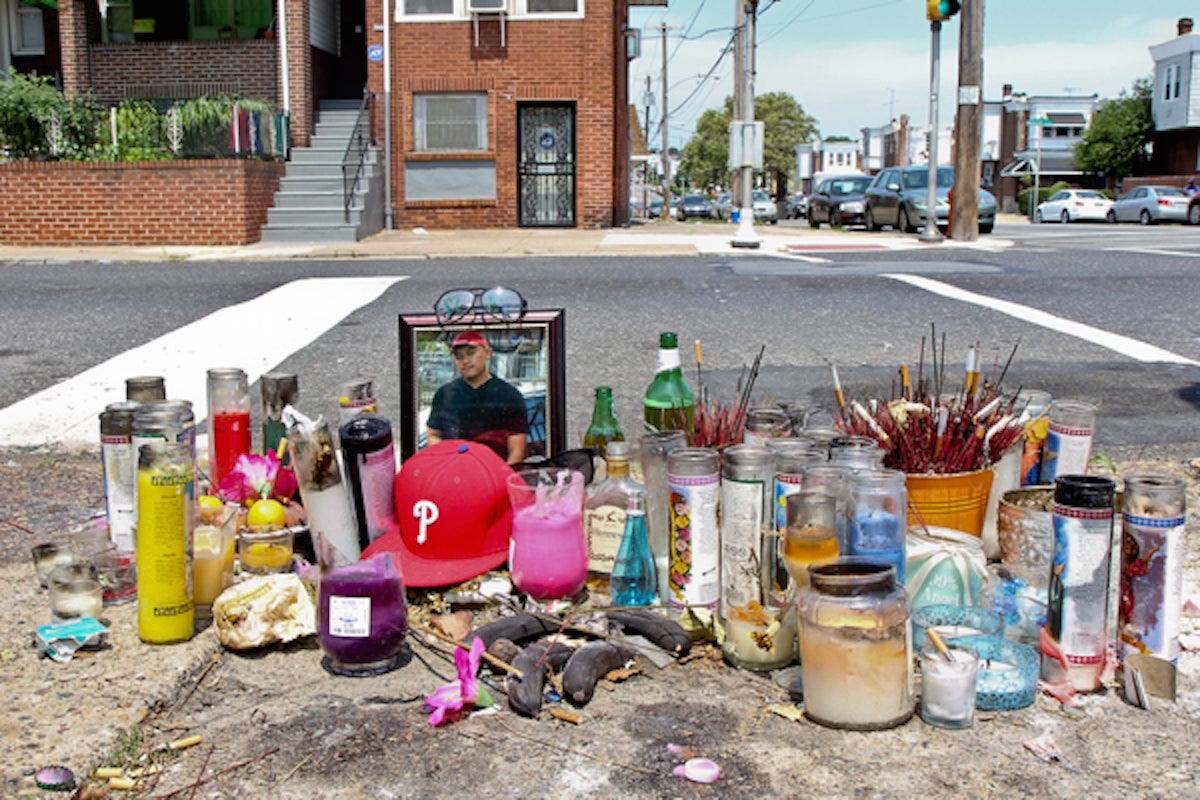Memorial Day for the Street Soldiers

Street memorial for Vanna "Tiny" Sok, 25, killed in a police shooting in July 2012. (Kimberly Paynter/for NewsWorks)
As we celebrate and remember those who died in America’s wars, we must also remember the war being fought in cities like Philadelphia.
On Memorial Day, we pause to celebrate those who’ve fought and died to protect our nation.
Though the holiday was originally created to honor Union soldiers who died in the Civil War, it was later expanded to include all fallen soldiers. As a result, those we honor today have largely died on foreign soil, giving their lives to uphold the American ideal of freedom.
These men and women were heroes, and we should never forget that sobering fact. However, as we celebrate and remember those who died in America’s wars, we must also remember the war being fought in cities like Philadelphia. It is a war in which there is no visible end. Even as the number of fatalities continues to decrease, it is a war we are losing miserably.
Last year in Philadelphia, there were 247 murders. That represents a 25.4 percent drop from the year before. But while the numbers decreased, the demographics of the victims did not change, and in truth, they haven’t changed for years.
In 2013, nearly 58 percent of murder victims were between 18 and 34-years-old. Over 90 percent of them were male. More than 77 percent of them were black. Over 81 percent of them were killed with guns.
The data indicate that North Philadelphia, both east and west of Broad Street, are hotbeds of gun violence and murder. Southwest Philadelphia is similar in that regard. In fact, three police districts in those areas accounted for 36 percent of Philadelphia’s shooting victims in 2013.
In other words, our city contains war zones. They are places where young men act out the rage that comes with hopelessness. These are young men who expect to live short lives. They are young men who would rather go out in a perceived blaze of glory than to spark and disappear like smoke. They are young men who believe they are fighting a war they inherited from those who died before them.
They fight over land that is not their own, with weapons they did not create, and for reasons not even they understand. These are young men who have dropped out of under-resourced schools and lived in impoverished communities. But like all young men, they want to be memorialized, even if that memorial is spray-painted on some godforsaken wall, or built with stuffed animals on a street corner.
Sadly, most of them won’t see memorials beyond their own corners, because there is no holiday to honor those who die on our streets. There is only our tendency to deride them.
Each time one of them falls, we make assumptions. We tell ourselves that they are victims of their own bad decisions, of their own reckless living, and of their own lack of vision. We tell ourselves, in many ways, that those who die on our streets deserve that fate. We tell ourselves that we are better off without them.
Could we be right about that? Could we be right in assuming that the poverty they face has nothing to do with the circumstances that led them to the streets? Could it be reasonable to assume that the low funding and low expectations in their educational environments had nothing to do with their failings? Are we right to ignore the lack of family support and poor environment that so many are unable to overcome? After all, there are many young men who come from such environments and thrive, in spite of the obstacles.
It’s my view that we can’t simply blame those who fall in Philadelphia’s war zones. At some point, we have to acknowledge that we are at war.
We are at war for the souls of our neighborhoods, for the character of our streets, and for the lives of our boys. It is a war we lose each time a young man falls. It is not hopeless, however. In fact, there is a clear path to victory.
We must invest in our street soldiers, and equip them to seek memorials in classrooms and boardrooms. We must invest in our neighborhoods, and prevent them from becoming war zones. We must build up our boys, and help them to grow into men. Otherwise, they will keep dying, and we will keep mourning, and their spray-painted memorials will fade away.
Their lives are worth so much more than that.
WHYY is your source for fact-based, in-depth journalism and information. As a nonprofit organization, we rely on financial support from readers like you. Please give today.


